Solid vs. Engineered Hardwood
A Closer Look at the Two Types of Hardwood Flooring
Many hardwood shoppers don’t realize there are two types of wood flooring — solid and engineered. Both solid and engineered hardwood flooring add value and structure to your home and are available in plenty of species, stains, and styles. So, what exactly are these two types of wood flooring, and how do they compare? So, let’s explore solid vs. engineered hardwood.
Solid vs. Engineered Hardwood Construction

Solid hardwood flooring is aspired by homeowners for its authenticity, timelessness, and durability.
Solid hardwood flooring is constructed of 100% hardwood from top to bottom. So, each plank is a solid piece of wood, typically 3/4 of an inch thick. It’s milled with tongues and grooves on opposite edges so that the boards interlock when installed. You always nail solid hardwood to a stable subfloor generally constructed of 3/4-inch plywood when installed.
However, there is one consideration with solid wood flooring. It’s susceptible to moisture because wood is porous. So, if water seeps into your floors, you can experience warping and cupping. As a result, you need to be careful where you use solid hardwood flooring.
Apart from that one concern, solid hardwood flooring is durable and reliable. It presents an excellent investment that will enhance the value of your home and provide beauty for a lifetime.
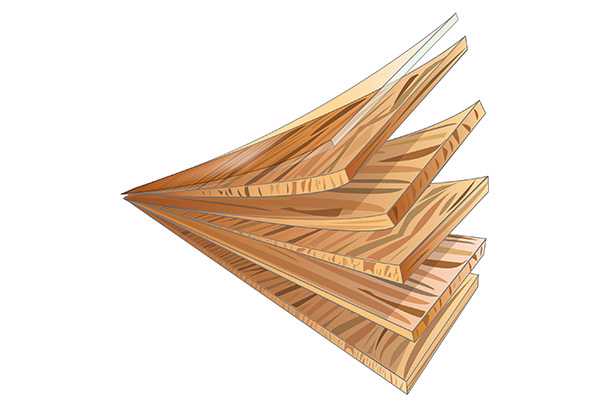
Engineered hardwood looks exactly like solid hardwood flooring. However, it consists of layers. Each plank’s top and bottom layers are 100% natural hardwood veneer from various species like oak, walnut, maple, and hickory. Planks typically come in two thicknesses, 3/8 and 9/16 inches.
A core resides between those two outer layers. More importantly, those core layers crisscross in different directions to add stability and water resistance to the flooring.
That highly stable core creates a hardwood floor that is less likely to expand, contract or shift when exposed to moisture, humidity, and temperature. As a result, engineered hardwood flooring is a great option in rooms subject to water concerns (like basements or kitchens) or over concrete slab and radiant heating systems.
Some manufacturers, like Hartco, warrant their engineered hardwood flooring for 50 years. So, you’ll enjoy nearly the same longevity as you would versus solid hardwood.
Design Options Between Solid Hardwood vs. Engineered Hardwood
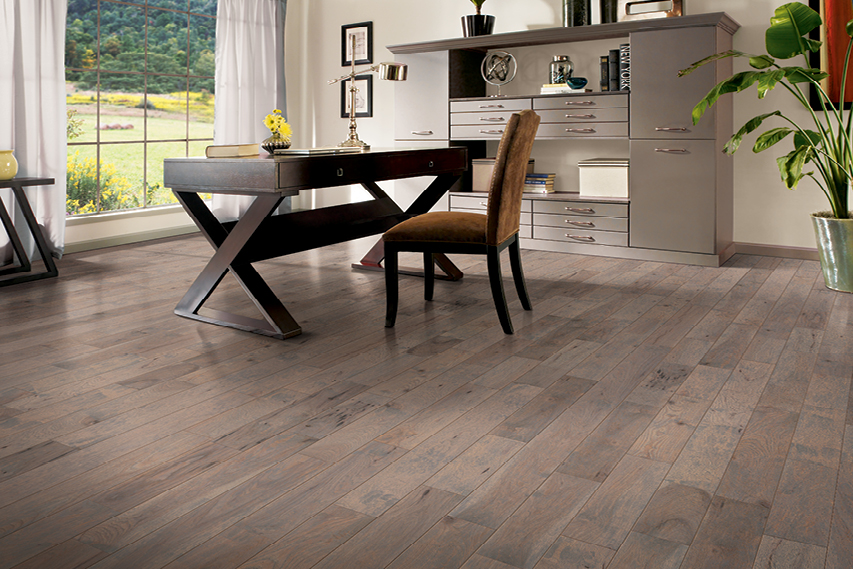
Solid Hardwood Flooring: You’ll find a huge selection of solid hardwood flooring to bring to life your personal style and décor, from traditional hardwood to on-trend colors to hand-scraped wood. The widest solid flooring available is 5″, a moderate width that strikes a balance between the extra wide-plank trend and classic looks.
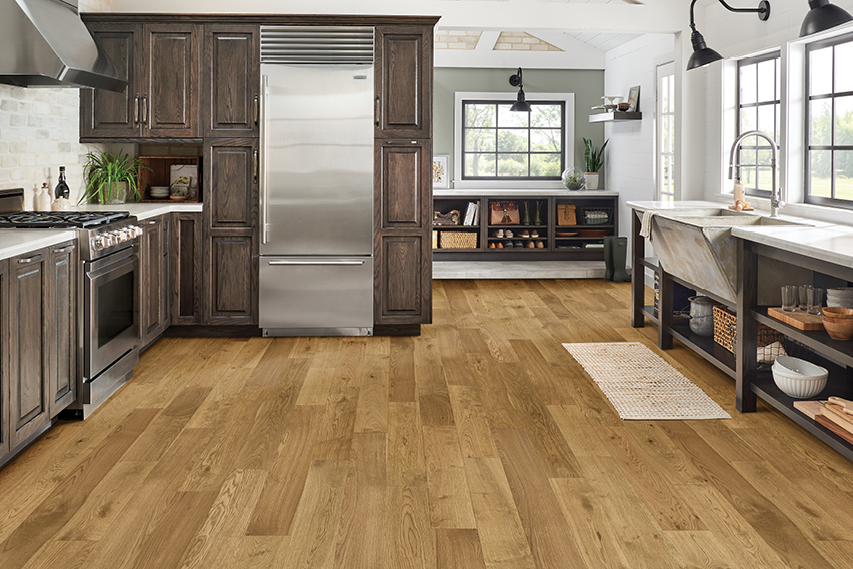
Engineered Hardwood: With a few exceptions, engineered hardwood flooring is available in a wide range of styles, ranging from traditional to specialty designs with features like multi-tonal colors and handcrafted tool markings. Certain looks, such as extra-wide planks, may only be possible with engineered hardwood.
Where can I install solid and engineered hardwood floors?
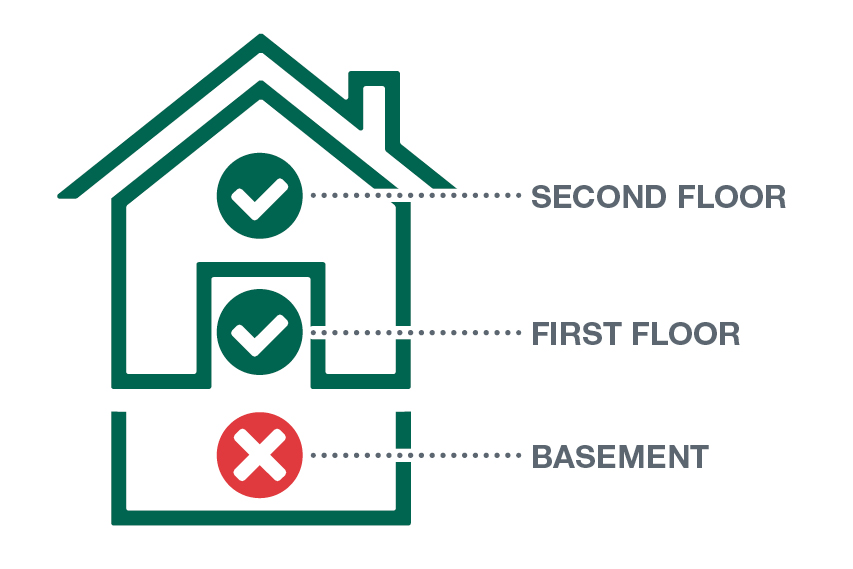
Solid Hardwood Flooring: Solid wood flooring is a great choice for the first and second floors, enhancing living spaces such as living rooms, dining rooms, kitchens and bedrooms.
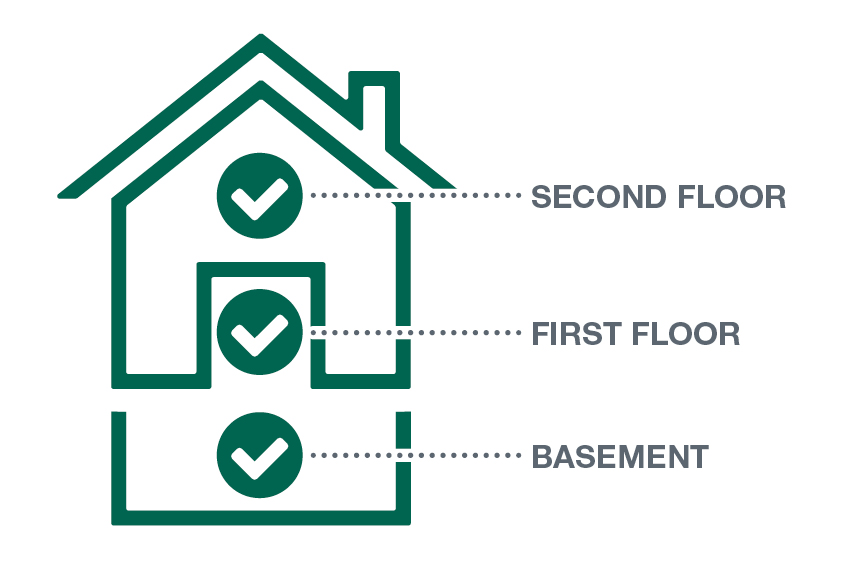
Engineered Hardwood: Engineered hardwood flooring is an excellent choice for areas where solid hardwood cannot be installed, like in basements, over concrete floors or over radiant heating systems.
What installation methods are available with engineered and solid hardwood flooring?
Solid Hardwood: Solid hardwood floors are installed using nails.
Engineered Hardwood: Engineered hardwood flooring has multiple installation options: staple, glue or float, including our locking technology, available on some products.
What’s more durable: solid or engineered hardwood?
Solid Hardwood: Solid hardwood flooring is known for its endurance. Because it is solid through and through, it can be sanded and refinished multiple times during a lifetime. And solid construction holds up well over time. Solid hardwood durability mostly comes down to the wood species and wear-resistance of its protective finish. Harder woods such as Hickory and Oak are more dent resistant, and those with more resilient finishes — like our Lifetime Finish powered by aluminum oxide nanoparticles — will perform best against scratches. Look for products with our Lifetime Warranty.
Engineered Hardwood: If your durability concerns are around moisture, humidity or temperature, engineered hardwood flooring is the way to go. Its layered construction provides stability against environmental changes. Premium engineered hardwood comes with our best warranty and a Lifetime Finish for superior scratch protection.

What types of wood species are available with engineered hardwood vs. solid hardwood?
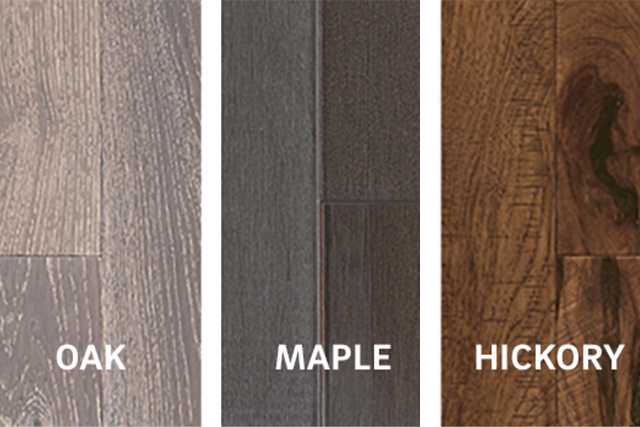
Solid Hardwood: We offer solid hardwood flooring in our three hardest and most wear-resistant species: Oak, Maple and Hickory.
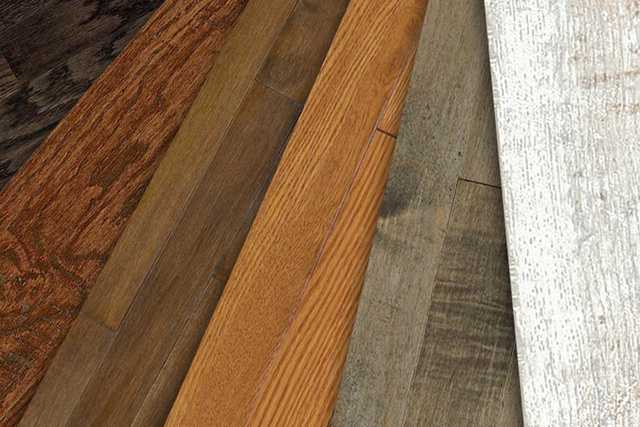
Engineered Hardwood: Engineered hardwood flooring has multiple species to choose from: Oak, Maple and Hickory, plus softer species like Birch, Cherry and Walnut, and exotic woods like African Mahogany, Acacia and Tigerwood.
What is the thickness of solid hardwood vs. engineered hardwood?
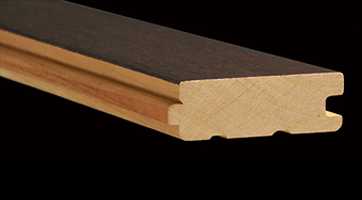
Solid Hardwood: Solid hardwood flooring is traditionally 3/4″ thick, except for parquet-style floors which are thinner.
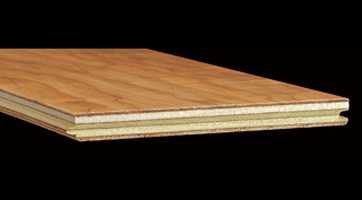
Engineered Hardwood: At 3/8” to 1/2″, engineered hardwood is slightly thinner than solid hardwood. Thicker woods are usually available in premium collections. Engineered hardwood floors can be a good choice if you need a thinner wood for an existing space — for example, to match the height of an adjoining floor or fit kitchen appliances into tight spaces between countertops and floors.
How does the sound underfoot compare?
Solid Hardwood: As might be expected, solid hardwood floors sounds and feels decidedly solid when you walk on it.
Engineered Hardwood: Sometimes, engineered hardwood floors can sound more hollow than solid under-foot, but that can be addressed by stapling down the planks instead of floating them. Premium engineered hardwood flooring is usually thick enough to look and sound just like “real hardwood.”
How does the cost of engineered wood flooring compare to solid?
Solid Hardwood: Solid hardwood flooring is the gold standard in flooring, and it’s usually the most price-premium board for board. There are, of course, many variables: solid hardwood collections can vary in price depending on the warranty, protective finish and how many finishing processes have been used to achieve a particular look. Distressed and scraped styles or those with unique staining techniques will be on the higher end.
Engineered Hardwood: As a whole, engineered hardwood flooring tends to be less expensive than solid hardwood, with the exception of premium collections that have a thicker hardwood top layer, uniquely artistic designs and enhanced durability. High-performance engineered hardwood products are also more on par with solid pricing.
Inspiration to Your Inbox
Sign up for news about our latest wood flooring innovations—and get inspired for your next project.
Sign Up
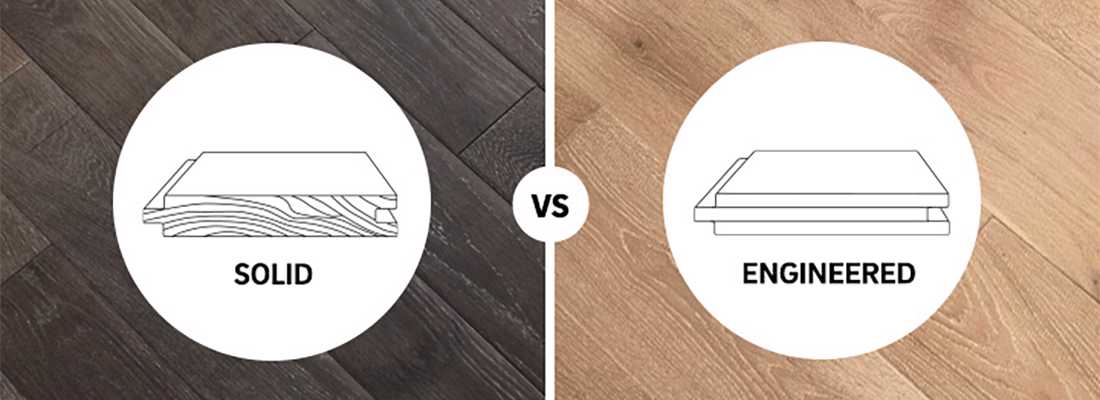
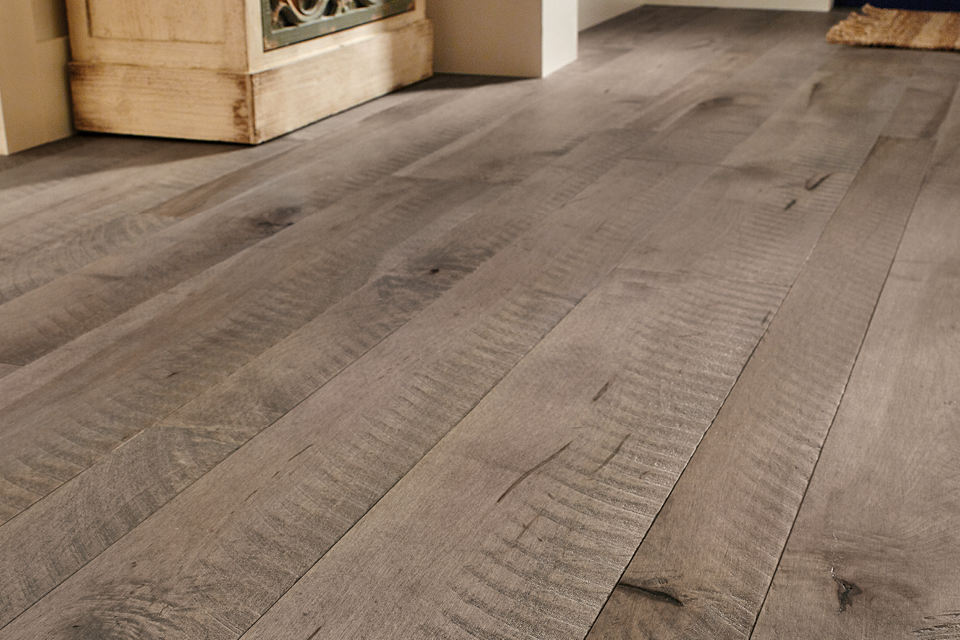 How to Choose the Best Hardwood Floor
How to Choose the Best Hardwood Floor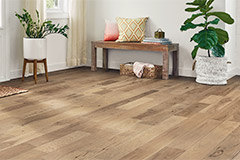 Wood Flooring Room Inspiration Guide
Wood Flooring Room Inspiration Guide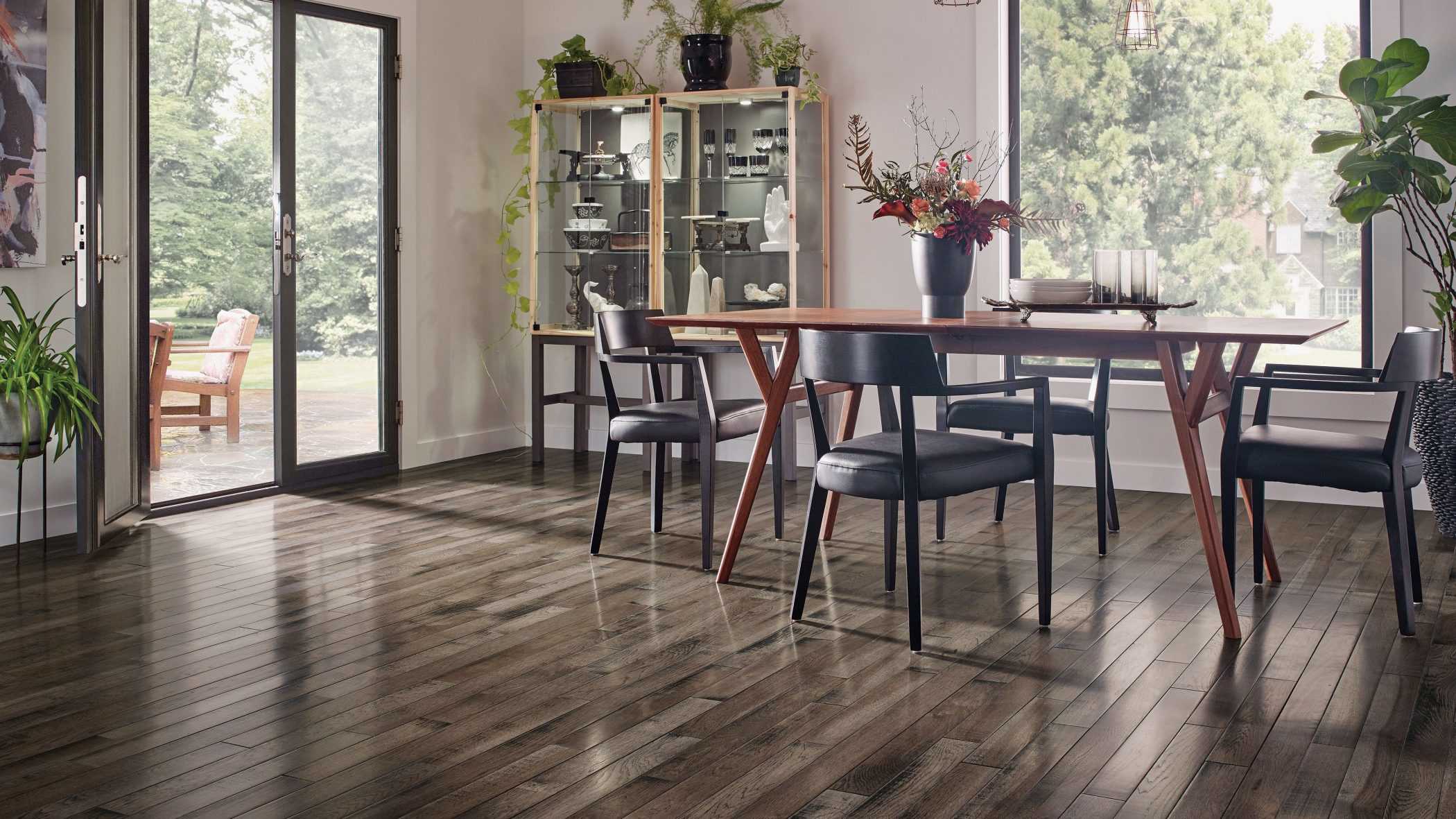 Floating Hardwood Floors
Floating Hardwood Floors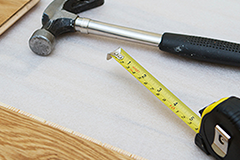 Hardwood Flooring Installation
Hardwood Flooring Installation